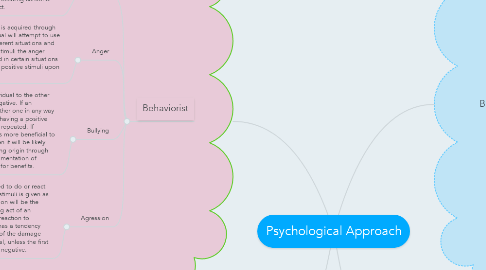
1. Behaviorist
1.1. Phobia
1.1.1. Due to the negative stimulus of fear of a traumatic event which is related by the mind to an object or character, the subject will get conditioned resulting in the subject to suffer from extreme panic upon receiving censorial stimuli of the related object.
1.2. Anger
1.2.1. Anger as a characteristic is acquired through conditioning. An individual will attempt to use different reactions in different situations and upon receiving positive stimuli the anger behavior will be repeated in certain situations which give the individual positive stimuli upon use.
1.3. Bullying
1.3.1. The relations from one individual to the other can be either positive or negative. If an individual interacts with another one in any way that would result in the self having a positive effect the interaction will be repeated. If bullying another individual is more beneficial to the bully than damaging then it will be likely done again. Probably bullying origin through mimicking or through experimentation of another individual in search for benefits.
1.4. Agression
1.4.1. An individual will be conditioned to do or react in an especific way if possitive stimuli is given as a result of the reaction. Agression will be the result of a random or mimiquing act of an individual that will remain as a reaction to sertain situations as long as it has a tendency for positive stimuli, regardless of the damage given to the damaged individual, unless the first was conditioned to see that as negative.
2. Biological
2.1. Phobia
2.1.1. Genes have made humans reflexibly fearful of sertain animals, places and things. Given that those who fear dangerous situations geneticaly are more likely to survive these genes are passed and therefore fear exist, in some individuals these fear is greater to the point where it becomes a phobia. If the parents of an individual carried reflexive fear genes or someone of the family it is possible that an individual reacts strongly and develops a phobia
2.2. Anger
2.2.1. Naturally hormonal processes that are regulated by genetics affect emotions. Given that it is genetic it will affect people differently and some people are more likely to react in strong ways than others. This is probably the result of a strong testosterone production gene.
2.3. Bullying
2.3.1. It is seen that animals that share part of the genetic tree with humans act in ways similar to bullying. The correlation in the data might prove that animals are more fit for survival if they are able to see as inferior and make another organism feel inferior to them. This might prove that bullying is something that can be transmitted genetically. if it can be transmitted genetically then it is likely that if a parent that bullied had a son it will likely be a bully to.
2.4. Agression
2.4.1. Species that can react aggressively to threats are more likely to survive than those than don't since they are more likely to defend themselves or take what needed for survival and this might be passed down genetically. If this trait can be passed down genetically a parent that had tendency to being aggressive and carried a aggressive gene it might pass it down to his son.
3. Social-cultural
3.1. Phobia
3.1.1. If any specific thing is presented as a negative thing that must be feared, since childhood, by a large number of people this will impact by producing a phobia towards the specified thing.
3.2. Anger
3.2.1. If a culture or society has a tendency to react with anger therefore the next generation will copy the previous one and result in multiple individuals that suffer from anger.
3.3. Bullying
3.3.1. If an individual is found by a society to be different and inferior to itself the individuals participating on the society will reject the individual resulting in bullying.
3.4. Agression
3.4.1. If a culture or society was as part of its tradition and lifestyle aggression this trait will be passed down by the members of the society.
4. Cognitive
4.1. Phobia
4.1.1. If a person sees an object that has damaged before it will reason that it should stay away from it and therefore dislike it and react by attempting to get away from it.
4.2. Anger
4.2.1. If a person is faced with a situation that represents a threat or source of frustration then the cognitive processors will reason that the best way to deal with the situation is with anger even if it has no real goal.
4.3. Bullying
4.3.1. If an individual persieves another individual it will classify it into a superior, equal or inferior and if both, an individual that feels superior and one that feels inferior, interact, they will treat each other accordingly and result in having bullying.
4.4. Agression
4.4.1. If a threat to an individuals well being is presented the mind will reason that the threat must be eliminated and in some cases this is considered to be possible with the main use of fiscal contact acts such as agression.
